Active shooters on campus. Belongings getting stolen. Fires in buildings. These are some of BJU students’ top concerns regarding safety on campus.
In light of the recent hurricane, the question of safety is more prominent on students’ minds than it may have been before. What if the hurricane had hit our campus directly? Or what if an active shooter came on campus? How do we protect ourselves from those who might want to do us harm?
It is important to be aware of not only what BJU is doing to protect us from these dangers but also what we can do for ourselves. Public Safety Chief Joseph Mulnix explained that for emergency situations, the University uses the emergency notification system to alert students, faculty and staff. The emergency notification system is most often used during bad weather, but this system can also be used in other situations.
Mulnix said one free tool students can use is FEMA, an app maintained by the Federal Emergency Management Agency. FEMA gives emergency alerts, information and general safety tips for any location you specify.“[FEMA] tells all the information a person should know to be best prepared,” Mulnix said. “I am very impressed by it.”
Mulnix uses FEMA for hurricanes and other inclement weather and suggests students look through the app to learn more about what to be aware of and what to do in various emergency situations. Students can download the app, called “FEMA,” in their app store on their mobile device.
Mulnix suggests entering public safety’s direct dial number, 864-770-1311, in your phone in case of emergencies. This will prevent you from having to search for the appropriate number in an emergency. If using a campus phone, you can also use the campus extension 1111.
Public safety patrols campus 24/7 the same way Greenville police patrols the city. They employ part-time and full-time officers who are registered through the South Carolina Law Enforcement Division.
Mulnix said he is not as concerned with the threat of a fire or natural disaster as much as he is for students’ personal safety.Compared to other universities and colleges, BJU sees significantly less crime. “Campus is a very safe place,” Mulnix said.
However, since the biggest issue of crime on campus is theft, Mulnix said students should take their locks seriously. “That room is your home,” he said. “Most of us at home lock our doors.”
If you have any important items in your room, Mulnix suggests keeping the room locked when you are away for any length of time. While the residence halls are still very secure, he is interested in seeing if the locks help cut down on the amount of theft that takes place.
Carmen Montes, a student public safety officer, also attested to the safety of BJU’s campus.
“Public safety has rules in place for safety reasons,” Montes said. “Not allowing visitors after cufew and controlling speed limits on campus, for example, both contribute to campus safety. Personally I think the locks in the dorms are a great addition. They make it safer because no one has access to your room other than your roommates.”
For off campus situations, Mulnix emphasized the importance of situational awareness. “Don’t be glued to your phone,” he said.When walking to and from your car—especially when you’re alone—it is important to be aware of what is happening around you.
Mulnix gave a real-life example from last semester about how important it is to be aware of surroundings. He said a faculty member was at a store near campus when she noticed someone suspicious lingering nearby. She quickly got into her car. The man tried to open the door after she got inside, but because she was aware of her surroundings and had locked the doors, she was able to get away without harm.
For more tips on campus safety, visit home.bju.edu/services/publicsafety/safetytips/ or download the FEMA app on your smartphone. Mulnix will also be doing two sessions on active shooters in Levinson Hall at 5 p.m. on Oct. 15 and 18. For last year’s video on active shooters, visit home.bju.edu/life/sfoc.php.






















































